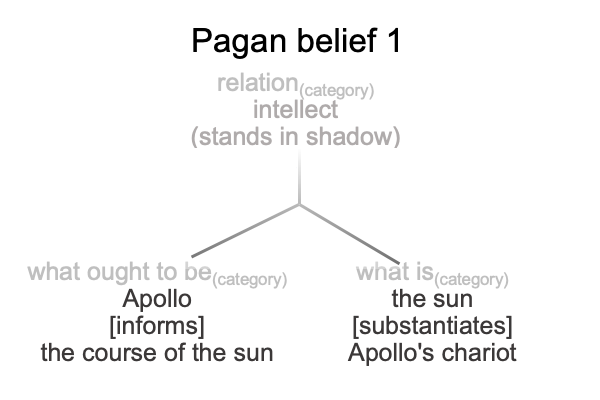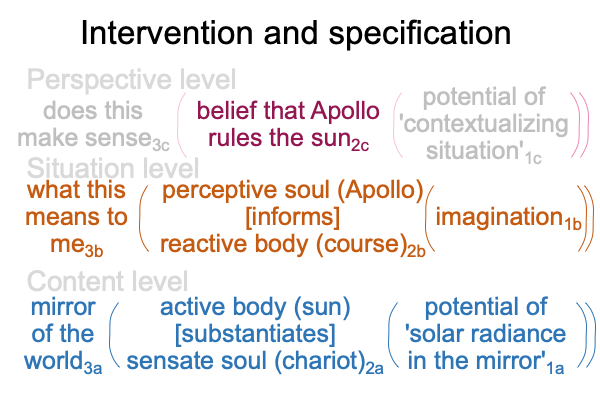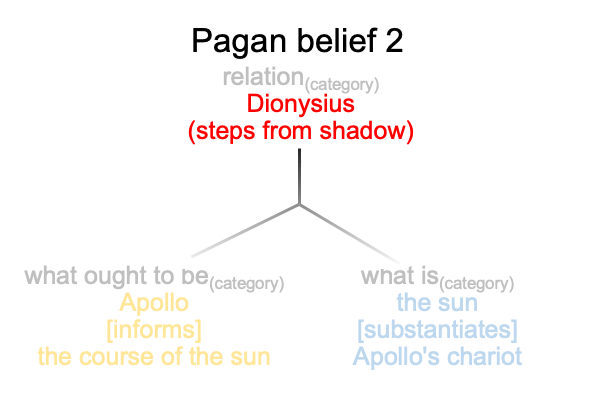0199 Here is a another thought experiment.
Apollo rules the sun. The sun is Apollo’s chariot. Apollo drives the chariot of the sun across the sky every day.
0200 Here is a diagram.

0201 Clearly, this pagan judgment2c resonates with the perspective-level actuality of human subjectivity2c.
Why hasn’t it unfolded into a commitment2c?
Ah, the intellect (relation) stands in shadow because the phantasm (what ought to be) and the sensation (what is)constitute a whole within the whole. May I call this partial wholeness, a “tautology”?
This tautology hides the intellect as the relation that brings what ought to be and what is together.
0202 So, how do ancient Greeks respond?
Some claim that Apollo is the god of reason.
Does this claim bring the intellect out of shadow?
Yes, Apollo promotes a certain preternatural awareness. There is more to the sun than a flaming chariot. The sun and Apollo’s chariot are given different names. When both appear in the mirror of the world3a, these names activate our bodily vision and our sensate soul2b. Clearly, we cannot look directly at the sun. We can see what Apollo’s chariotilluminates. The source of illumination is both overwhelming and divine. Perhaps, in the brilliance, past, present and future are revealed.
0203 Apollo’s radiance is the intervention2c that draws us to phantasms and sensations that honors reason2b, if only by way of metaphor. Have our own intellects fallen into shadow? Or are they blinded by the brilliance of Apollo driving his chariot?
Apollo’s light2c should guide us through our day2b.
Like the path of Apollo’s chariot2c, our day should run a straight course.

0204 Is this evil?
Is this a privation of the good?
Does human subjectivity, in our current Lebenswelt, somehow distort commitment2c into ‘something2a‘ characteristic of… what?
0205 We name and foreground some elements. We fail to notice other elements. We construct artifacts that validate our idols. As long as the artifacts are salient, as long as they guide our sensations and engage our phantasms, our idolatries persist. Yet, a disturbing element always hovers in the shadows. And when we can see it, we lose our perspective. We lose our minds.
0206 One of the ancient Greek plays to survive the gauntlet of time is the Bacchae, by Euripides. It tells a tale about an unfortunate city, where the citizens, possessed by Dionysius, the personification of the intellect in shadow, withdraw. The king, Apollo personified, takes rational action. He goes out to spy on what they are doing. The mob sees a wild lion, kills him, cuts off his head, and brings the trophy back into the city. Only then does Dionysius step back into the shadow.
The mob carries the head of the king.
0207 Oh, the play is far worse than my telling.
When Dionysius steps into the minds of the mob, he stands as an intellect unable to ascertain what is or what ought to be. He arrives as the most intoxicating idea that anyone can imagine. His wine tells my mind that what ought to be no different than what is. Or, is it the other way around?
Apollo, the god of reason, is eclipsed.

0208 What does this imply?
Is tautology better than disorientation?
Does a tautology appear like reason compared to the madness of disorientation?
Is Apollo’s tautology a privation of the commitment2c that corresponds to original justice2c?
Is Dionysian disorientation a privation of Apollo’s tautology?
0209 I need not explore the permutations of tautologies and fixations.
I need only establish that the ability of speech-alone talk to name elements of the perspective level actuality2c of human subjectivity ends up foregrounding some elements and backgrounding others.
0210 So, I return, with Houck, to Aquinas, who makes a simple extrapolation.
If evil is the privation of good, then original sin is the privation of original justice2c.
